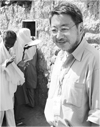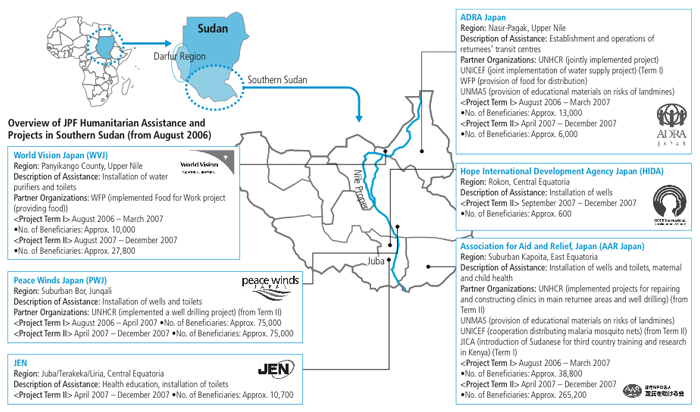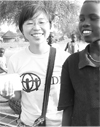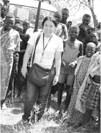Japan's Official Development Assistance White Paper 2007
Column 11 Sudan: Resolving the Greatest Humanitarian Crisis of the Century
Sudan is the largest country on the African continent, with approximately 6.6 times the area of Japan and a population of around 37 million; a size roughly 30% of Japan's population. The north-south civil war, which had continued for over 20 years since 1983, was finally put to an end in January 2005 by the conclusion of the Comprehensive Peace Agreement (CPA). However, the impact of protracted conflict is deep and extensive the country has been left in total devastation: basic infrastructures such as roads and waterworks have been destroyed, weapons and landmines are widely abandoned, food supply and healthcare are minimal, and education is disordered. Furthermore, it is expected that 550,000 refugees that fled to the neighboring countries of Ethiopia and Kenya, as well as more than 5 million internally displaced persons will be returning home to southern Sudan. In light of this situation, Japan proactively provides support to Sudan for the consolidation of peace.
Grant aid is instrument to assist the return of refugees and internally displaced persons, food supply, clearance of landmines and unexploded ordinances, medical services, prevention of infectious diseases for children, water supply, livelihood for poor farmers, and education through various international organizations such as UNHCR, WFP, UNMAS, UNICEF, ICRC, and IOM. Japan has also launched technical cooperation, in the field of development studies for urban planning and vocational training.
Japanese NGOs conduct emergency humanitarian assistance with the official development assistance fund provided through the Japan Platform (JPF).* These Japanese NGOs work together with the United Nations Agencies: i.e. UNHCR, WFP, UNICEF, UNMAS and other international NGOs from the project formulation stage in order to make the projects cost effective (see box on right for details).
However, a new conflict began in the Darfur region of western Sudan in February 2003 that has generated more than 2.5 million refugees and internally displaced persons. The Darfur Peace Agreement (DPA) was concluded in May 2006; however, only one faction from the rebel side participated in the agreement, and as the side became more and more fragmented, the situation only worsened. Unified comprehensive efforts made by international society that center around the United Nations and African Union for achieving everlasting peace are needed now more than ever.
Building Peace through Food Assistance
Kenro Oshidari, Sudan Office, United Nations World Food Programme (WFP)
I have worked in 10 different countries and regions as staff to the United Nations, and, among those 10, Sudan in particular suffers from extremely cruel circumstances. Building on the country's chronic poverty, the impact from the north-south conflict that continued for over 20 years along with the currently progressing Darfur Conflict has been great, creating a total of nearly 7 million refugees and a situation where one in six children age five or below suffers from malnutrition.

(Photo: WFP)
In response to this situation, the WFP currently provides food assistance for 5.5 million (one sixth of the total national population) people throughout all of Sudan, centered on the southern region where reconstruction efforts are gradually advancing after the conclusion of the Comprehensive Peace Agreement (CPA) and in Darfur where conflict continues. The food assistance to Sudan provided by the WFP is the largest of any of their other projects worldwide, totaling ¥87 billion, or more than 25% of the WFP's annual planned disbursements. Moreover, 2,500 people, 25% of the organization's staff, work on this project, including eight Japanese staff.
Peace cannot be created in a situation where one must worry about food for the following day. People can only begin concentrating on creating peace once concerns over the food supply have disappeared. We want to contribute to peacebuilding in Sudan through food assistance.
Recently, the WFP has been focusing on a school feeding program. This program aims to attract children to school, improve their nutrition level, and increase attendance ratios by providing them with school meals. Attendance figures in fact rose by 24% in FY2006 at schools where meals were provided. I intend to scale up the school feeding program as widely as possible in order to encourage the children who have an important role for the peace and future of Sudan.
Utilizing assistance from Japan, the WFP also contributes to peacebuilding in Sudan, including landmine removal and a road construction project in the southern region. In southern Sudan, roads had been torn apart by road destruction and mines planted during the years of civil war; however, by constructing and repairing road, food can be transported by trucks now instead of airplanes. Moreover, ample benefits were brought to residents, including halving the price of bus fares and energizing trade with neighboring countries. People are feeling the "peace dividend," and I believe that this is one of the great achievements of Japanese assistance.
The greatest issue is law and order. Even after the conclusion of the Darfur Peace Agreements (DPA), fighting continues in Darfur and law and order is actually worsening. Assaults on persons involved with humanitarian assistance are on the rise, including three drivers being shot to death last October. There are also instances where the deteriorating law and order hinders the delivery of food. This is truly regrettable. Food from the WFP is a lifeline that supports human lives. The issue of how to maintain the safety of staff while delivering food without fail is of great importance.
In 2006, the WFP Sudan office received approximately ¥2.5 billion from the Japanese Government. Funding from Japan is supporting the people of Sudan. I sincerely hope that Japanese people learn more about the current situation in Sudan and pay more attention to the peacebuilding process.

(Photo: WFP)

So That People Can Return Home in Peace
Sayo Ryokai, Expatriate in Sudan, ADRA Japan
With financial cooperation from the Japan Platform and the UN Refugee Agency (UNHCR), ADRA Japan began a project to establish and operate "returnees' transit centres" that support the return process of refugees in Pagak and Nasir within the Upper Nile state of southern Sudan. Approximately 80,000 Sudanese refugees are registered in Ethiopia. At the centers, returnees are registered, provided with transport arrangements, ensured lodging for several days, educated about risks of landmines, and provided with food and basic necessities so that they can safely return to their home villages in Sudan.
Infrastructure in Sudan has been left underdeveloped due to long-term conflict and the land turns into wetland as the rainy season lasts for half of the year. Surpassing these challenges, an opening ceremony was held for the centers in March 2007. Since their opening, they have received nearly 7,000 refugees and successfully returned them to their homes.
I have witnessed numerous joyous reunions upon transporting refugees home. These experiences include a family that had been bathing in a river crying out joyously while running, still naked, to hug their daughter upon seeing her arrive in a car, and a grandfather that had been bedridden getting up after seeing his granddaughter return. Returnees told me on ample occasions that, "I had heard that there was nothing established yet in Sudan, but it was a great help that there were bathrooms, water, shelter, and these types of facilities. I am so grateful to ADRA."

(Photo: ADRA Japan)
So That People Can Live in Peace
Kyoko Minami, Programme Manager, Association for Aid and Relief, Japan (AAR Japan)
What do people think of when they hear the word "Sudan"? Perhaps dry land, poverty, and the Darfur Conflict. Also, a civil war between the north and south that continued for over 20 years.
In southern Sudan, the impact of this conflict has caused an absolute lack of the infrastructure necessary for daily life. Returnees from surrounding countries all say that, "I cannot see a future for me and my family even if I return to my home in Sudan as there are no wells, schools, or hospitals." Thus there are many cases where those that walk the long road home from refugee camps in neighboring countries actually return back to those camps as they have developed facilities and education for available for their children.
Association for Aid and Relief, Japan (AAR JAPAN) has been drilling boreholes and conducting hygiene education and malaria prevention activities since August 2006 in Eastern Equatoria within southern Sudan. AAR JAPAN has thus far drilled 30 boreholes in the region (as of October 25, 2007). However, there are places where drilling itself is virtually impossible because of the large number of leftover landmines. Furthermore, it is not guaranteed that water will be found even if a borehole is drilled. Despite the arduousness of the efforts, a single hand-pump well successfully established in a village dramatically transforms the lifestyle of its residents. The effects for securing safe and clean water, improving the hygiene situation, preventing illness, and reducing the amount of time necessary for fetching water are immeasurable. I will continue the project while considering what we can do as a Japanese NGO and what I can do as a Japanese myself for the issues at hand as though they are my own.

(Photo: Association for Aid and Relief, Japan)


 Next Page
Next Page